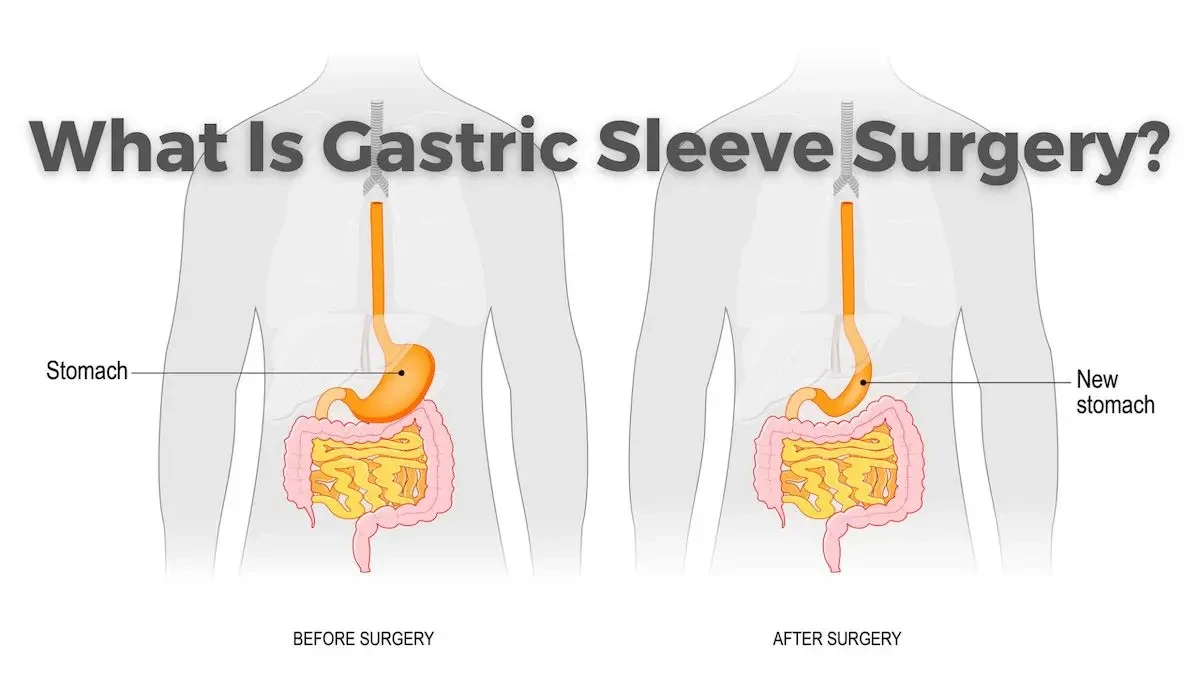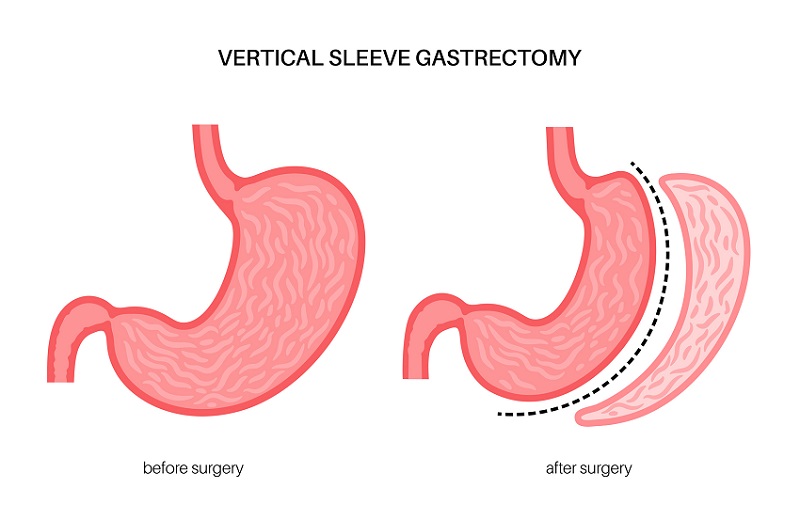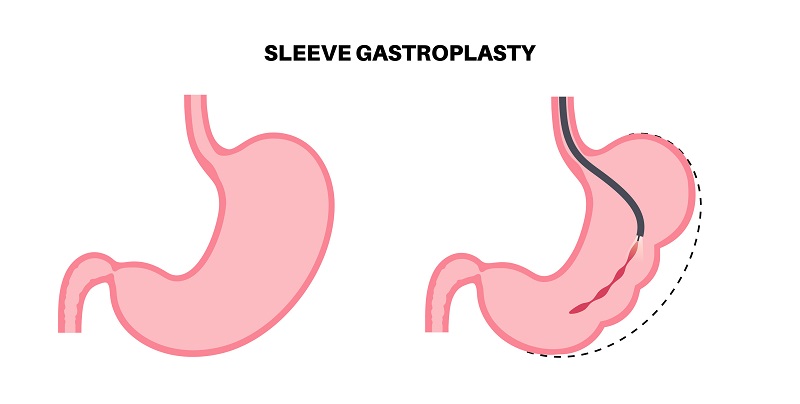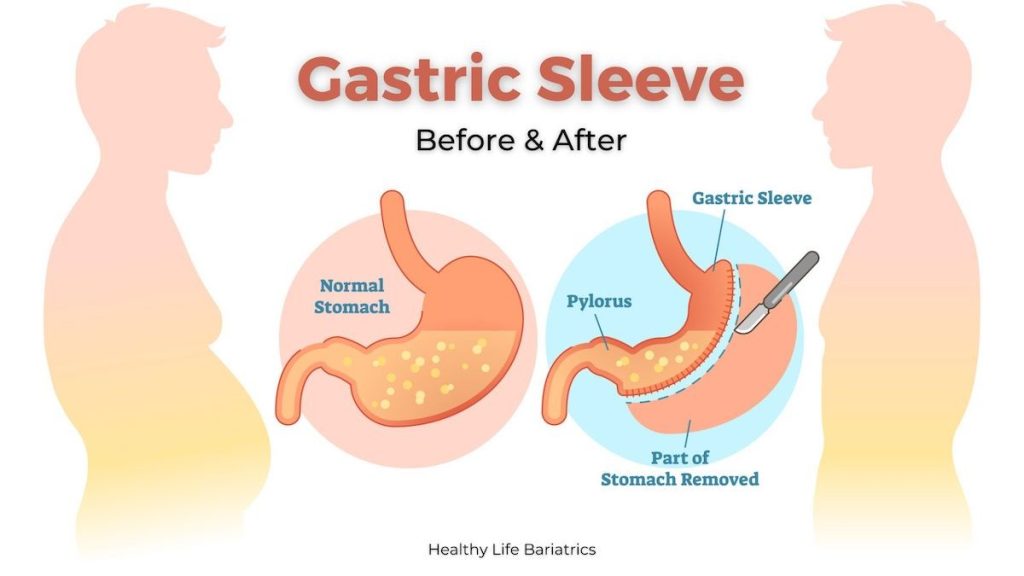Understanding the gastric sleeve cost is crucial for those considering this life-changing procedure. Although the cost of a gastric sleeve procedure can be substantial, investing in one’s health is often priceless. Gastric sleeve surgery has proven effective for many struggling with obesity and related health conditions. Yet, its affordability remains a concern for potential candidates. In evaluating the gastric sleeve cost, one must consider various factors, including insurance coverage, out-of-pocket expenses, post-operative care costs, and more.
The Mechanics of Gastric Sleeve Surgery

In gastric sleeve surgery, up to four-fifths of the stomach is eliminated, leaving a narrow “sleeve” or tube-like structure that becomes the new belly.
This drastic reduction curbs physical hunger and minimizes emotional eating due to decreased production of ghrelin – commonly referred to as ‘the hunger hormone’. With less ghrelin circulating in their system post-surgery, patients can control portion sizes and make healthier dietary choices. Intriguingly enough, candidates for this life-altering operation are typically about 100 pounds overweight, with a Body Mass Index (BMI) hovering around 40 or higher.
Types of Gastric Sleeve Surgery in Los Angeles
When considering gastric sleeve surgery in Los Angeles, understanding your options is essential for making an informed decision. There are two primary types of gastric sleeve procedures available: laparoscopic sleeve gastrectomy and endoscopic sleeve gastroplasty. The fundamental difference lies in their permanence – laparoscopic procedures are permanent surgical solutions, while endoscopic procedures offer a reversible, non-surgical alternative.
Laparoscopic Sleeve Gastrectomy (LSG)

This is the gold standard gastric sleeve surgery in Los Angeles, representing a permanent bariatric procedure. During LSG, surgeons remove approximately 80% of the stomach, creating a sleeve-shaped pouch. This procedure also removes the portion of the stomach that produces ghrelin, the hunger hormone, leading to significant appetite reduction and enhanced satiety. Los Angeles bariatric surgeons perform this minimally invasive procedure through small incisions, resulting in faster recovery times and reduced scarring.
Endoscopic Sleeve Gastroplasty (ESG)

ESG offers a non-surgical gastric sleeve alternative in Los Angeles for patients seeking a reversible option. This minimally invasive procedure uses an endoscope to place internal sutures, reducing stomach volume by approximately 70%. ESG can be repeated if needed and serves as an excellent option for patients who may not qualify for traditional surgery or prefer a less invasive approach.
Los Angeles Gastric Sleeve Surgery Pricing by Type
| Type of Gastric Sleeve Surgery | Average Cost in LA | Cost Range |
|---|
| Laparoscopic Sleeve Gastrectomy (LSG) | $12,500 | $8,500 to $28,000 |
| Endoscopic Sleeve Gastroplasty (ESG) | $11,800 | $9,200 to $22,500 |
Bountiful Health Benefits Stemming from Weight Loss via Gastric Sleeve Surgery
It isn’t just about shedding excess body mass; much more is at stake here. Alongside facilitating considerable weight loss, gastric sleeve surgery has been found instrumental in improving several obesity-related health conditions such as Type 2 diabetes, sleep apnea, heart disease, and high blood pressure.
Patient testimonials reveal better management of Type 2 diabetes after undergoing this surgical intervention. Sleep apnea symptoms have shown remarkable improvement along with overall sleep quality, largely due to neck circumference reductions following substantial weight loss.
In addition to these benefits is the potential decrease in cardiovascular risks associated with obesity, like heart disease and high blood pressure, by guiding individuals towards achieving an optimal BMI range through sustainable lifestyle changes post-procedure. So essentially, what we’re looking at here isn’t merely cosmetic transformation but profound enhancement on multiple fronts.
Key Takeaway: Gastric sleeve surgery is more than a weight loss procedure – it’s a life-altering journey. By shrinking the stomach and reducing ‘the hunger hormone’, this surgery aids in controlling food intake, making healthier dietary choices easier. Beyond significant weight reduction, patients can experience improvements in obesity-related health conditions like Type 2 diabetes and sleep apnea.
Factors Influencing the Cost of Gastric Sleeve Surgery
The cost of gastric sleeve surgery is not fixed and can vary depending on several factors. The patient’s past and present medical situation can affect the cost of gastric sleeve surgery.
1-Patient’s Health Condition and Medical History
The patient’s current health status significantly determines the final cost of gastric sleeve surgery. For instance, individuals with a high body mass index (BMI) may require more extensive preoperative tests or longer hospital stays, leading to increased costs.
If the patient is managing chronic conditions such as diabetes or heart disease alongside obesity, their post-operative care may be more comprehensive, which can also drive up expenses. Therefore, assessing one’s health condition is crucial to understand the potential surgical costs.
2-Body Mass Index (BMI)
Body mass index (BMI) not only determines eligibility for bariatric procedures but also affects their cost. As mentioned earlier, patients with higher BMIs often require additional resources and procedures, contributing to higher prices.
For perspective, the average cost of gastric sleeve surgery is around $14,350. However, this cost can vary between $9,420 and $34,541, depending on factors such as BMI. You can find detailed information on how these variables impact pricing structures across healthcare providers and regions.
| BMI Range | Pricing Level | Additional Cost |
|---|
| BMI 35-40 | Standard pricing | $7,423 – $15,000 |
| BMI 40-50 | Moderate complexity | + $2,000 – $5,000 |
| BMI 50+ | High complexity | + $5,000 – $10,000 |
3- Los Angeles Surgeon Experience and Reputation
The surgeon’s experience and reputation also affect the price of gastric sleeve surgery in Los Angeles. Skilled bariatric surgeons also cost more because of their abilities and popularity. A good surgeon increases safety and motivates long-term weight loss effectiveness. Dr. Moein, with over 20 years of bariatric surgery experience, represents the caliber of expertise available in Los Angeles.
4- Hospital and Facility Fees in LA
Los Angeles gastric sleeve surgery costs include significant facility fees that vary by location:
- Premium LA hospitals: $8,000-$15,000 in facility fees
- Outpatient surgery centers: $4,000-$8,000 in facility fees
- Community hospitals: $5,000-$10,000 in facility fees
5- Insurance Coverage
Insurance coverage is a crucial factor that affects out-of-pocket expenses. Unfortunately, not all insurance plans cover weight loss surgeries like gastric sleeves. It is essential to understand your policy’s limitations before making any treatment decisions.
To get insurers to cover such procedures, there are typically requirements that prove that obesity has led to severe health complications despite unsuccessful attempts at dieting under professional supervision. It is worth noting that Medicare might cover the procedure if your BMI exceeds 35 and you have other obesity-related illnesses.
6-Additional Costs of Gastric Sleeve Surgery: Post-Operative Care, Follow-Up Visits, and Recovery
Beyond the surgical procedure, post-operative care and follow-up visits must be considered for a more comprehensive gastric sleeve cost. These factors play a significant role in your overall expenditure.
Understanding Post-Operative Care and Follow-Up Visits
The success of gastric sleeve surgery depends on frequent post-operative check-ups with the surgeon. Follow-up consultations facilitate early detection of complications and quick recovery. Additional diagnosis may increase the treatment expense.
Managing Time Off Work After Surgery
Recovery from gastric sleeve surgery takes on average around two weeks. Planning this income loss is important because it has monetary implications to be considered pre-operatively.
Comprehensive Los Angeles bariatric programs include:
| Service Type | Cost Range | Details |
|---|
| Pre-surgery Evaluations | $1,500 – $3,000 | Complete medical assessment |
| Nutritional Counseling | $200 – $500 per session | Ongoing dietary support |
| Follow-up Appointments | $150 – $300 per visit | Post-surgery monitoring |
| Support Groups & Wellness | $100 – $500 monthly | Group therapy and programs |
Key Takeaway: Understanding the gastric sleeve surgery cost isn’t a one-size-fits-all affair. Your health condition, BMI, and insurance coverage are pivotal in this financial equation. Higher BMIs or chronic conditions like diabetes can increase expenses due to extra tests or extended hospital stays. Also, remember that not every insurance plan covers weight loss surgeries.
Now that we have covered the major aspects influencing the costs associated with gastric sleeve operations let’s delve deeper into insurance coverage specifics. We will explore topics such as pre-authorization processes and what constitutes out-of-pocket expenses.
Exploring Insurance Coverage for Gastric Sleeve Surgery
Navigating the financial aspects of gastric sleeve surgery can be complex, but understanding your health insurance plan limitations and the pre-authorization process is a key part of this journey.
Different insurance companies offer varied coverage policies when it comes to bariatric surgery. Some may not cover these procedures at all. Reviewing your policy or consulting with an insurer representative to clarify what’s covered and anticipate any out-of-pocket expenses is important.
| Insurance Provider | Coverage Level | Out-of-Pocket Cost |
|---|
| Kaiser Permanente | 80-100% coverage | $500 – $3,000 |
| Anthem Blue Cross | 70-90% coverage | $1,000 – $5,000 |
| Health Net | 60-80% coverage | $2,000 – $8,000 |
In some cases, such as those involving Medicare beneficiaries with a BMI greater than 35 and obesity-related health conditions, gastric sleeve surgeries might be covered. However, meeting certain requirements, such as providing medical necessity documentation or demonstrating unsuccessful attempts at other weight loss methods, could be prerequisites for approval.
The Pre-Authorization Process
Prior authorization involves securing explicit approval from your insurer before undergoing surgery. Without prior authorization, you may face significant out-of-pocket expenses post-procedure, even if bariatric surgery is generally within your plan’s coverage spectrum. Compliance with insurer processes is crucial here.
Out-of-Pocket Expenses & Requirements for Insurance Coverage
Beyond initial operation costs that insurers might cover under favorable circumstances, additional fees, including deductibles and co-pays, are tied directly to hospital stays or physician services during recovery periods after gastric sleeve procedures. These factors should inform decisions about pursuing this life-changing intervention based on both personal needs and financial considerations.
7. Selecting an Appropriate Center for Your Procedure
The journey to a healthier you begins with choosing the right surgical center. This task may seem daunting, but understanding what to look for can make all the difference.
Surgeon Qualifications and Experience:
Board-certified surgeons with bariatric experience manage complications better. Always inquire about their experience.
Success Rates & Patient Testimonials: Real-Life Experiences Matter
Examining success rates and patient testimonials provides insights beyond just numbers. Success rates indicate how many patients experienced significant weight loss after undergoing procedures at a facility.
Finding a Reputable Center: More Than Just Surgeons And Success Rates
Beyond the Surgeon Consider centers with comprehensive pre- and post-operative care and advanced surgical technology. These factors enhance long-term weight management and recovery safety.
Weighing the Costs of Different Weight Loss Surgeries
Comparing gastric sleeve surgery to other popular weight loss procedures, such as lap band or gastric bypass, let us further examine the costs associated with each.
Key Takeaway: Gastric sleeve surgery cost isn’t just about the operation. It’s a combo meal deal, with post-op care and follow-up visits adding to your bill. Factor in time off work for recovery, travel expenses for clinic visits, and dietary changes – it all adds up. Don’t forget to weigh these costs against other weight loss surgeries before choosing.
Decoding the Costs: Gastric Bypass, Lap Band, and Other Weight Loss Surgeries
The decision to undergo weight loss surgery is not made lightly. Considering cost-effectiveness is a factor when making the decision to undergo weight loss surgery. But how does one measure this when comparing gastric bypass vs lap band vs other bariatric surgeries?
Gastric Bypass: A Cost Comparison
Gastric bypass surgery typically has higher upfront costs than procedures like lap bands or other bariatric surgeries due to its complexity and longer hospital stay.
“However, it’s not just about initial expenses,” says Dr. Moein from Health Life Bariatrics. “One must also consider potential improvements in chronic health conditions associated with obesity.”
Lap Band Surgery: The Affordable Choice?
A lap band seems affordable, with lower average costs than gastric sleeve or bypass surgeries.
“But there are additional aspects such as follow-up appointments and possible adjustments needed over time that can add up significantly,” adds Dr. Moein.
Exploring the Financing Options for Gastric Sleeve Surgery
Financing gastric sleeve surgery can feel overwhelming, but several options are available to help ease the financial burden. Let’s delve deeper into these options.
Credit Card Payments: A Viable Option?
Using credit cards to finance surgical procedures is not a new concept. This method provides an immediate solution, allowing patients to repay the cost in manageable installments according to their card’s payment plan. It is essential to consider the interest rates connected with this option, as they can raise the total cost.
One notable advantage is that some credit cards offer rewards or cash-back features, which can help offset expenses indirectly. Additionally, if you use a local credit card, you won’t be affected by changes in exchange rates, making it a reliable choice regardless of your location.
“While healthcare-specific providers like CareCredit offer lower interest rates than standard consumer credit cards, along with extended repayment periods tailored for medical expenses, including bariatric surgeries.”
Tailored Payment Plans from Medical Providers
Beyond traditional financing methods like loans or credits, many healthcare centers now offer direct payment plans. With this arrangement, patients can gradually pay off their treatment costs over time without worrying about external factors such as fluctuations in exchange rates affecting their repayment amounts.
This payment scheme often requires no upfront fees and provides flexible terms based on individual financial circumstances. It’s definitely worth considering when planning your weight loss journey through gastric sleeve surgery.
Key Takeaway: Financing your gastric sleeve surgery doesn’t have to be a headache. From using credit cards with cash-back rewards, healthcare-specific providers like CareCredit offering lower interest rates and extended repayment periods, to direct payment plans from medical centers – you’ve got options. Remember, the right center for your procedure should boast experienced surgeons and flexible financing arrangements.
Gastric Sleeve Cost: A Guide for Your Weight Loss Journey
Does insurance cover gastric sleeves?
Some health insurance can cover gastric sleeve surgeries if you meet their specific criteria, including BMI and obesity-related health conditions.
How much do you have to weigh to get a gastric sleeve?
You’re typically considered for gastric sleeve surgery if you are around 100 pounds overweight or have a Body Mass Index (BMI) of 40 or higher.
How many years does the gastric sleeve last?
A well-maintained gastric sleeve is designed to last indefinitely. However, lifestyle choices play an essential role in maintaining long-term results.
Does the gastric sleeve work for life?
The procedure’s effectiveness depends on your commitment to dietary changes and regular exercise post-surgery. With healthy habits, it could provide lifelong benefits.
Conclusion: Gastric Sleeve Cost Los Angeles, CA
Gaining knowledge about the specifics of gastric sleeve surgery is an important part of beginning your weight-loss program. The procedure offers numerous health benefits, from improved diabetes control to reduced heart disease risk.
Yet, its cost can vary widely based on factors such as the patient’s health condition and medical history. Navigating insurance coverage for this type of bariatric surgery might seem daunting, but it can be manageable with careful planning.
Remember that additional costs like post-operative care expenses and time off work affect the financial picture. Different weight loss surgeries come with different price tags – comparing these could help you decide which route to take.
Ready to Take the Next Step?
Understanding gastric sleeve surgery costs is only the beginning. At Healthy Life Bariatrics, we provide comprehensive guidance—from insurance verification to long-term success planning.
📞 Call us at (310) 861-4093 or schedule an online consultation to get personalized answers today.





